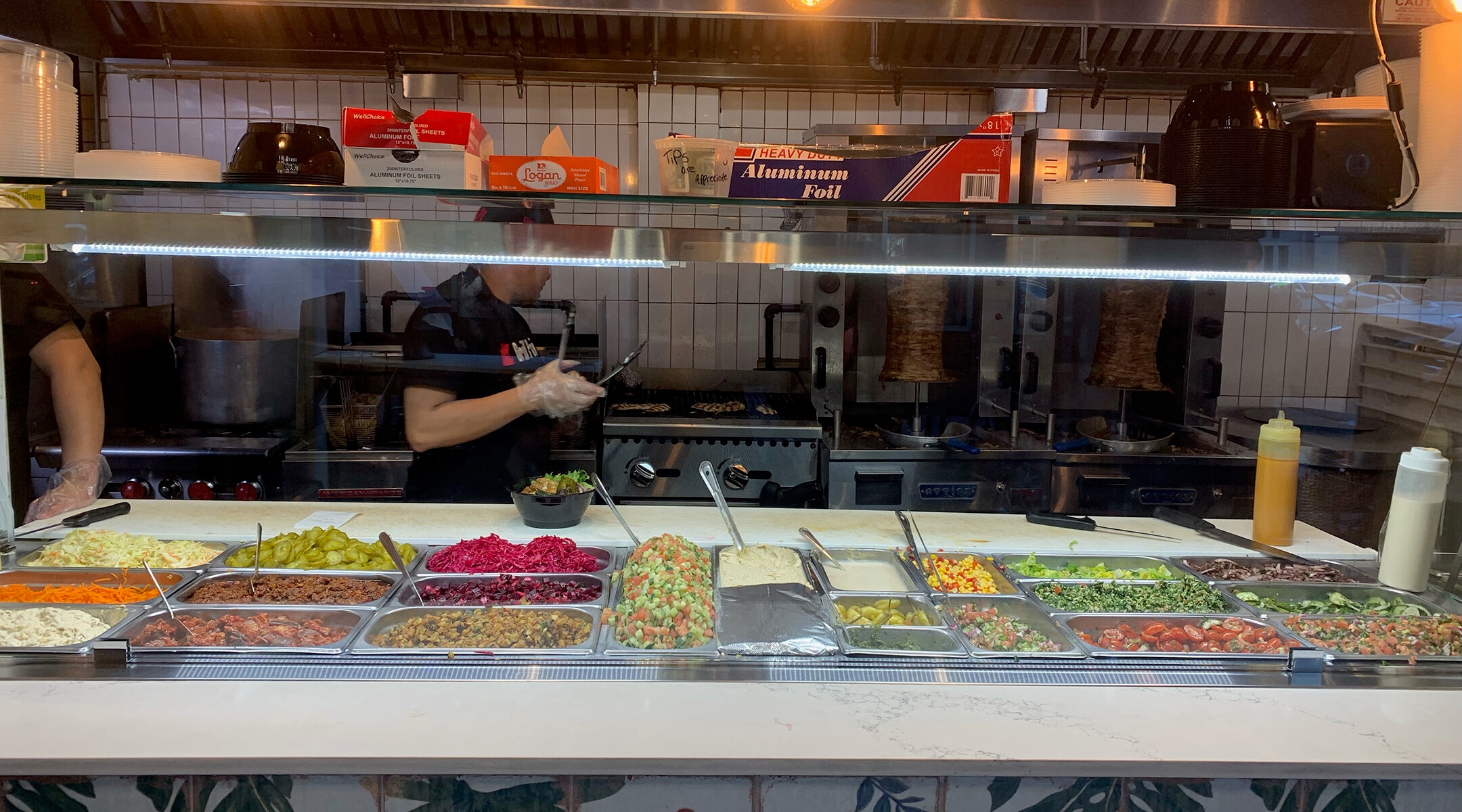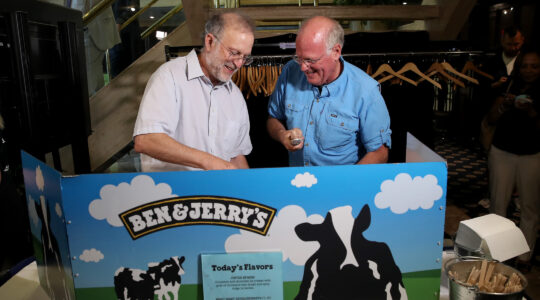This article was produced as part of JTA’s Teen Journalism Fellowship, a program that works with Jewish teens around the world to report on issues that affect their lives.
(JTA) — On a recent Tuesday before his basketball team’s evening practice, sophomore Gabe R. and several of his friends headed to Grill Point NYC, a kosher Mediterranean restaurant on the Upper East Side of Manhattan. Looking at the menu, Gabe was stunned by the prices: $26.50 for a bowl of schnitzel over rice, quinoa or salad. With no other kosher options open in the neighborhood, Gabe passed on dinner, practicing his ball-handling and shooting and ignoring his growling stomach.
Usually, though, he tries to find something he can afford. “I don’t like missing out. When all my friends go out for lunch, I don’t want to be the only one absent,” said Gabe. “I just look for less expensive items.” Most frequently this means ordering “a drink, dessert, or a side of fries,” said Gabe, who asked that his full name not to be used for fear of bullying over his financial situation at his Jewish high school.
Kosher food is hardly immune from the trend of rising inflation. In March 2022, inflation in the U.S. hit a 40-year high at an annual rate of 8.5%. Since then, the Federal Reserve has been aggressively raising interest rates to lower inflation, which, in January 2023, was 6.4% higher than January 2022. Although many Americans are struggling with food inflation, observant Jews bear an additional burden, as kosher meat already costs approximately 20% more than non-kosher meat, according to Slate Magazine.
Faced with high prices, many Jewish teens who keep kosher are limiting the frequency in which they patronize kosher restaurants. Some teens, primarily those who regard eating out as a key aspect of their social lives, have committed to ordering cheaper menu items when meeting friends. Others have eliminated eating out entirely. Such sacrifices have tangible effects on the relationship of kosher teens to Judaism. In addition to the crimp on their social lives, some teens say it is affecting their relationship with Judaism.
Yonatan Benichou, a junior at the Abraham Joshua Heschel School on the Upper West Side of Manhattan, said that he has recently stopped going out to eat at kosher restaurants with friends. “As a student with no income, I have no control over how much money I can spend. Kosher restaurants are very expensive,” he said.
Being kosher during a period of high inflation impacts Benichou’s social life. “Some of my non-kosher friends can eat a Big Mac [Combo] Meal at McDonalds” or a burger, fries and a drink for about $12 in New York City. “There is no such option for me. It’s frustrating,” said Benichou. At Burgers and Grill, a popular kosher eatery on the Upper West Side, a similar combination meal starts at $18.
This new reality has altered Benichou’s relationship to Judaism. “I didn’t choose my denomination. The truth is that I can’t get a cheaper lunch with my [non-kosher] friends because of some random laws in the Torah,” he said. “This makes me more resentful of Orthodox Judaism.” Primarily, the prohibitive cost of a kosher restaurant meal has led Benichou to question the validity of mitzvot for which the Torah does not give a specific reason, called “chukim.” Traditional sources include the rules of kosher food among these “non-rational” regulations.
There are few cheap, kosher fast-food options, in large part because of the wholesale price of kosher food. While a pound of chicken drumsticks at Park East Kosher Butcher in NYC costs $9.98 — $9.30 a year ago — a pound of non-kosher Springer Mountain Farms Chicken Drumsticks, sold on FreshDirect, is $2.79. The kosher fast food restaurant Holy Schnitzel offers a regular chicken sandwich, coined the “Holy Toasty,” for $15.99 at its Upper West Side location. Chick-fil-A’s classic chicken sandwich is $6.29 at their Upper East Side location.
But the higher cost of kosher meat is not the sole reason for the lack of kosher fast food restaurants, said Dani Klein, founder of YeahThatsKosher, a guide to kosher restaurants and travel. Since fast food restaurants need to sell a high volume to turn a profit, the pandemic — which “killed the volume game,” according to Klein — meant that kosher restaurants could succeed only if they had high profit margins. “Every restaurant will choose the best way to maximize its profits,” said Klein. “Fancy restaurants can charge a lot more than the cost of their products by virtue of the fact that they are offering an upscale experience.”
Hunter Bernhardt, also a junior at the Heschel High School, said that he rarely goes out to eat with his friends due to inflation. Living in Riverdale in the Bronx, getting to school in Manhattan is often costly. “Everything, from gas prices to Uber fares, have increased with inflation. I can’t spend too much on expensive food when transportation is my priority,” Bernhardt said.
Although inflation has altered his spending, Bernhardt said that his relationship to Judaism has not been affected. “I am grateful to live in a place and attend a Jewish day school where kosher foods are accessible to me.” Indeed, students at the Heschel School, which gave three times more financial aid in the 2022-23 school year than a decade prior, have access to kosher breakfast and lunch every school day for no additional fee on top of tuition. Bernhardt also said that going out to eat isn’t that important to his social life. “Many of my friends aren’t kosher anyways. We do other things, like play basketball in Central Park and chill at a friend’s house.”
JTA has documented Jewish history in real-time for over a century. Keep our journalism strong by joining us in supporting independent, award-winning reporting.






